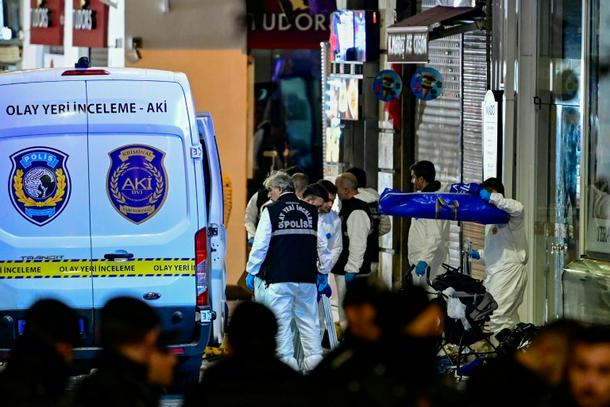
Istanbul police said 46 people had been detained in total after the attack
Istanbul (Turkey) (AFP) - Turkey on Monday accused the outlawed Kurdistan Workers’ Party (PKK) of carrying out a deadly bomb attack in Istanbul, saying a Syrian woman was in custody suspected of planting the device.
The bombing killed six people and wounded 81 others in the popular shopping street of Istiklal Avenue on Sunday shortly after 4:00 pm (1300 GMT).
There has been no claim of responsibility.
Turkish President Recep Tayyip Erdogan called the bombing a “vile attack” that had the “smell of terror”.
A nine-year old girl and her father, as well as a 15-year-old girl and her mother were among those killed in the attack.
Istanbul police said Monday that 46 people had been detained in total.
Erdogan’s government accused the PKK of carrying out the explosion shortly before the president landed in the Indonesian resort island of Bali for the G20 summit.
Police footage shared with Turkish media showed a young woman in a purple sweatshirt being apprehended in an Istanbul flat.
“The person who planted the bomb has been arrested,” interior minister Suleyman Soylu said in a statement broadcast by the official Anadolu news agency early Monday.
- ‘Order from Kobane’ -
Turkish police quoted by private NTV television, said the chief suspect is a Syrian woman working for Kurdish militants.
“According to our findings, the PKK terrorist organisation is responsible,” Soylu said.
The PKK, blacklisted as a terrorist group by Ankara as its Western allies, has kept up a deadly insurgency for Kurdish self-rule in southeastern Turkey since the 1980s.
PKK-affiliated Kurdish militants control most of northeastern Syria.

The explosion tore through Istiklal Street on Sunday afternoon. No individual or group has claimed the attack
“We believe that the order for the attack was given from Kobane,” he said, referring to a city in Syria near the Turkish border.
It was also the site of a 2015 battle between Kurdish militants and Islamic State jihadists, who were driven out after more than four months of fighting.
Regularly targeted by Turkish military operations, the PKK has been at the heart of a tussle between Sweden and Turkey, which has blocked Stockholm’s bid to join NATO since May, accusing it of leniency towards the group.
NTV shared an image taken from a surveillance camera, showing a young woman dressed in trousers and wearing a loose black scarf running away in the crowd, referred to as the bomber.
- ‘Psychologically affected’ -

Turkish President Recep Tayyip Erdogan called the bombing a 'vile attack' that had the 'smell of terror'
Justice minister Bekir Bozdag told Turkish news channel A Haber that a woman was “sitting on one of the benches for more than 40 minutes, and then she got up”, leaving a bag.
“One or two minutes later, an explosion occurred,” he said.
Istiklal Avenue reopened early Monday to pedestrian traffic.
Mecit Bal, who runs a small shop a few metres from the scene, said his son was working at the time of the blast.
“My son was there. He called me and said an explosion happened. He will not go back to work today. He is psychologically affected,” he told AFP.

People walk away as Turkish policemen try to secure the area after the blast
All the benches have been removed and a red carpet covers the site where the explosion occurred, on which passers-by come to lay red carnations, an AFP journalist reported.
Istiklal Avenue was previously targeted during a campaign of bombings across Turkey in 2015-16 that were blamed mostly on the Islamic State group and outlawed Kurdish militants, killing nearly 500 people and wounding more than 2,000.
Kemal Ozturk, a shopkeeper, said he feared a new explosion ahead of elections due next June.
- ‘Live with fear -

Turkish policemen secure the area after a blast in Istanbul
“In election period it can happen. It can happen here or in any city,” the 42-year-old told AFP. “We live with fear”.
Images posted on social media showed the explosion triggered panic, with people running in all directions.
“I was 50-55 metres away, suddenly there was the noise of an explosion. I saw three or four people on the ground,” witness Cemal Denizci, 57, told AFP.
“People were running in panic. The noise was huge. There was black smoke,” he said.
Istiklal, in the historic district of Beyoglu, is one of the most famous arteries in Istanbul. Criss-crossed by an old tramway and lined with shops and restaurants, it attracts large crowds at the weekend.
Turkey’s radio and television watchdog, RTUK, banned broadcasters showing footage of the blast, a measure previously taken in the aftermath of extremist attacks.
Access to social media was also restricted after the attack.
International condemnation flooded in from across the world.
“We stand shoulder-to-shoulder with our NATO Ally Turkey in countering terrorism,” said White House Press Secretary Karine Jean-Pierre.
Regional rival Greece condemned the blast and French President Emmanuel Macron said: “We share your pain. We stand with you in the fight against terrorism”.
Ukrainian President Volodymyr Zelensky also tweeted in Turkish: “The pain of the friendly Turkish people is our pain.”